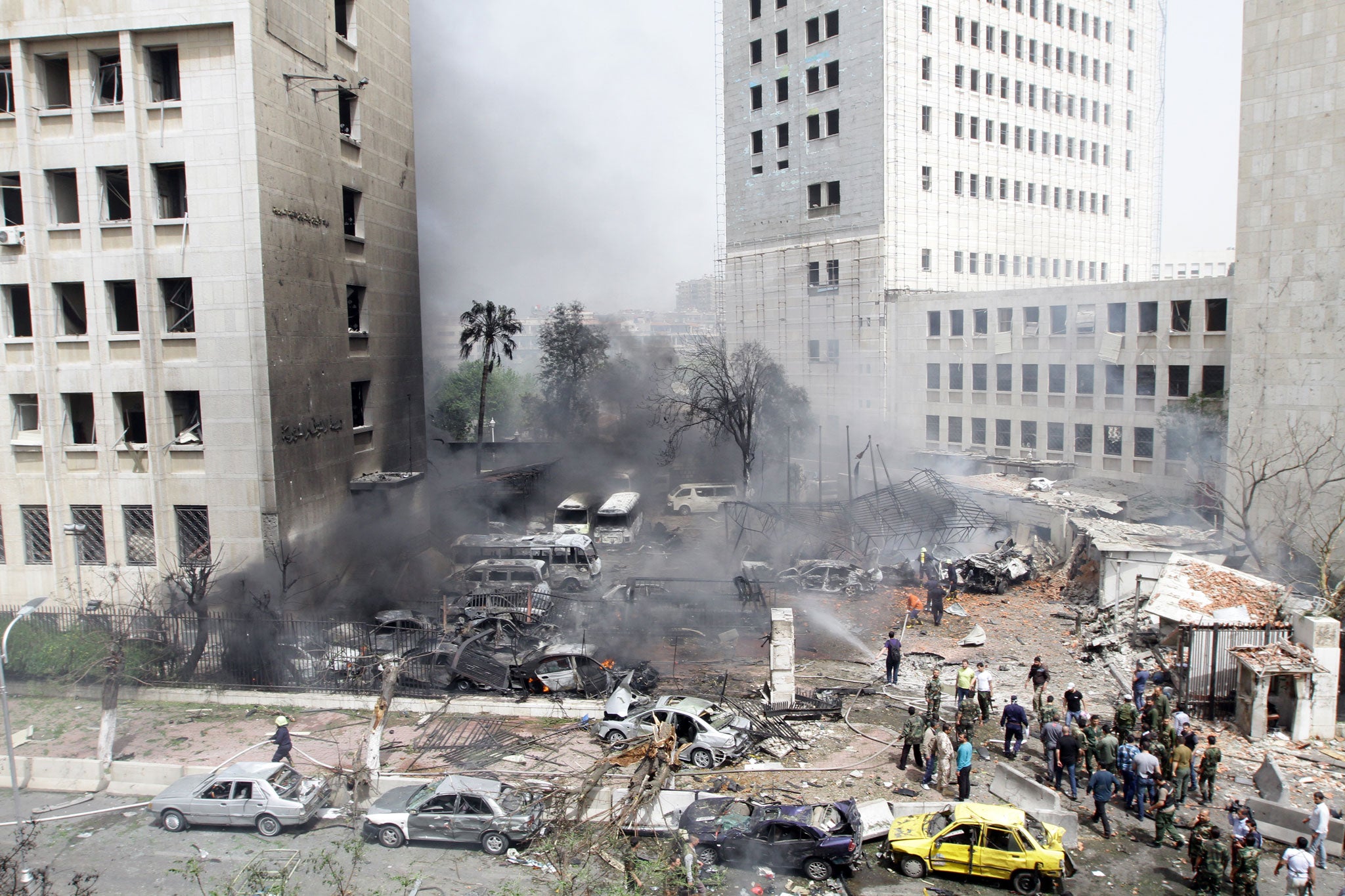The Independent's journalism is supported by our readers. When you purchase through links on our site, we may earn commission.
Robert Fisk: At a checkpoint, watching for bombs, the talk turned to religion
Soldiers facing the threat of suicide bombers in Damascus tell The Independent's Middle East correspondent of their fears for the future of Syria


Your support helps us to tell the story
From reproductive rights to climate change to Big Tech, The Independent is on the ground when the story is developing. Whether it's investigating the financials of Elon Musk's pro-Trump PAC or producing our latest documentary, 'The A Word', which shines a light on the American women fighting for reproductive rights, we know how important it is to parse out the facts from the messaging.
At such a critical moment in US history, we need reporters on the ground. Your donation allows us to keep sending journalists to speak to both sides of the story.
The Independent is trusted by Americans across the entire political spectrum. And unlike many other quality news outlets, we choose not to lock Americans out of our reporting and analysis with paywalls. We believe quality journalism should be available to everyone, paid for by those who can afford it.
Your support makes all the difference.“Can you imagine the psychology of my soldiers when they stand here all day, knowing that one of these cars could be a suicide bomber?” The Syrian army colonel eyed the two long lines of cars trailing past the Assad library, each pulling to a gentle, slightly frightened halt. Most of the checkpoint men were bearded. The colonel was a Sunni Muslim – since all journalists now want to know the religion of everyone they meet in this country – and asked that I do not print his name. We were welcome to take pictures but, please, no faces. The colonel did not say so, but I know the reason. Months ago, several soldiers were assassinated after apparently being identified on a clip of Russian television news tape.
And as for the psychology of the colonel’s men? Well, they are now enduring what Iraqi forces and Nato soldiers across Afghanistan and especially Americans in Iraq have confronted; the knowledge that the next car could blow up in your face. Since the suicide bomber came to Damascus this month, the regime realises that the kamikaze is probably unstoppable. So the colonel’s soldiers approach the drivers politely but with great care. ID card. Destination. Boot open. Much of the traffic in the centre of Damascus is now channelled through three main streets – the rest are cordoned off. The result: traffic jams of epic proportions and more soldiers on patrol.
But the colonel is a phlegmatic man and, like many Syrian officers, is prepared to speak his mind. Yes, of course he supports the President but he thinks before he speaks (a rare quality in soldiers) and talks about religion as well as suicide bombers.
“You know, religion is not meant to be something you use to control people,” he says. “Religion should be something that makes people joyful and happy. All extremist organisations use religion for organising but religion is for beautiful things. I don’t like it when you use the word ‘Islamist’ for ‘extremist’. Extremists are not Muslims.” I try to explain that in English, we often use “ Islamist” for “extremist”, that “Muslim” in an English context means just that: a Muslim. He frowns. I mention Osama bin Laden and he shrugs.
“You know, bin Laden’s job was not to think. His job was to obey and carry out orders and operations. Maybe he did not work for the Americans. But for the West?” We are now in conspiracy country – although as usual, I have to admit that bin Laden was fighting on our side against the Soviets – and the word Boston creeps into our conversation. He is afraid the Americans will send their troops here, blaming Syria, as they sent them to Iraq after 9/11.
I say no, the Americans have no enthusiasm for another Middle East war. The colonel disagrees. Yes, the US will send “its” soldiers but they won’t be American. They will be sent locally by Qatar and Saudi Arabia.
The UN is amassing war crimes indictments against all kinds of armed groups in Syria – the government army very much among them – but the fact remains that this conversation would have been impossible – unthinkable – before the uprising. The war has given a freedom of speech even to soldiers to debate among themselves, as they do, about the war. The colonel lamented the fact that he had to tell me he was a Sunni. “We never talked like this before. We never thought in terms of religion. We were Syrians.”
I reflect on this for several minutes. If everyone was a Syrian before the revolt, then why did the uprising begin in the first place? Even the most lick-spittle supporters of the regime admit that deeper causes must be admitted for the terrible tragedy now overwhelming this country. It’s not good enough just to blame “ terrorists” as all governments do when they want to demonise their enemies. But...
The government in Damascus yesterday stated that the bodies of the eight air force officers – including two generals – said to have been beheaded by rebels in Idlib province after their helicopter was apparently shot down, had been brought to the Latakia Military Hospital. All, according to a government official, had been beheaded. Several, he said, had – before or after death – had their eyes taken out. No further details were forthcoming. In Syria these days, you hear these things from both sides; and you fear they may be true. Take it or leave it.
Join our commenting forum
Join thought-provoking conversations, follow other Independent readers and see their replies
Comments